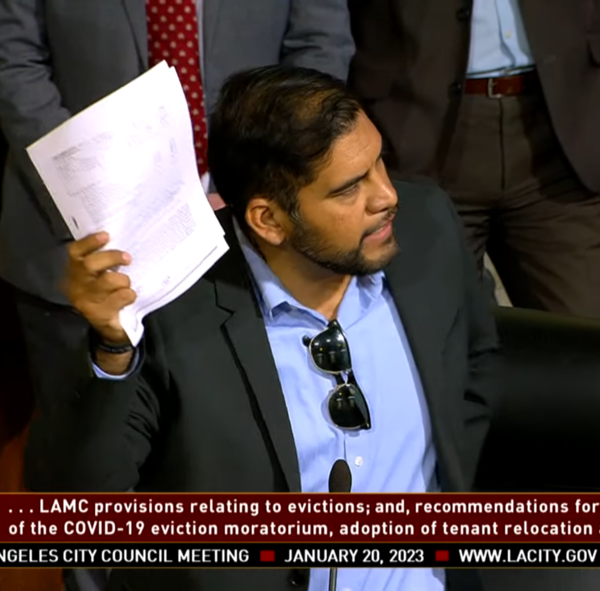This afternoon the L.A. City Council approved new protections for renters. The new tenant protections are anticipated to take effect by February 1, when temporary pandemic eviction restrictions are set to expire.
Councilmember Nithya Raman, one of the council's most dedicated renter advocates in recent years and very much the main architect of today's ordinance, termed today's vote "the most significant since the institution of the Rent Stabilization Ordinance." The RSO, approved in 1978, protects many L.A. renters, but it only applies to housing built in or before 1978, and does not apply to single-family homes.
According to testimony today by Los Angeles Housing Department Assistant General Manager Anna Ortega, the RSO currently applies to about 650,000 households. Today's renter protection ordinance expands benefits (similar to, but separate from the RSO) to an additional estimated 400,000 L.A. renter households living in units built since 1978, plus about 129,000 households renting single-family homes. Meaning more than a million L.A. renter households will now be protected.
Much of the new ordinance had been worked out in the council's Housing and Homelessness Committee earlier this week. The three main components of the expanded renter protection are:
- Universal Just Cause: The RSO outlines specific allowable causes for evictions, such as failure to pay rent, illegal activity, etc. Just Cause requires a landlord to specify the reason for eviction from the RSO list. In cases where landlords evict tenants without an approved cause (called a "no fault" eviction), then the landlord is required to pay tenant relocation costs.
- Relocation Assistance for Tenants subjected to Large Rent Increases: Landlords will be required to pay renter relocation costs in some cases where landlords raise rents more than ten percent.
- Minimum Threshold for Failure to Pay Evictions: Landlords will not be allowed to evict tenants who fall just a small amount behind on rent. Eviction would only be allowed if the unpaid rent exceeds one month's worth of fair market rent (currently $1,747 for one-bedroom, $2,222 for two-bedroom).
Today the council heard nearly two hours of public comment, most of which favored strengthening protections for L.A. renters, especially toward preventing evictions that could swell the numbers of the city's unhoused population. Community groups - including leaders of the Keep L.A. Housed Coalition (Strategic Actions for a Just Economy (SAJE), Community Power Collective, Alliance of Californians for Community Empowerment (ACCE) Action, Public Counsel) and others - rallied renters in support of the proposal. See Keep L.A. Housed Twitter thread of tenant testimony from today.
Public comment also included opposition from landlords and landlord organizations; these comments mainly stressed the needs of "mom & pop" landlords, though a few speakers, including City Councilmember Hugo Soto-Martinez, noted that over 70 percent of the city's landlords are corporate.
Wow: CM Hugo Soto-Martinez, fiery, and holding his own RSO lease agreement: "What we're really talking about his who does this city represent? [..] And by creating a two-tier system, we are giving our power to those corporate landlords who have profited off working people." pic.twitter.com/e1EffaQFrc
— Knock LA (@KnockDotLA) January 20, 2023
During the council debate, Soto-Martinez held up a copy of his own lease, for an RSO-protected unit, urging the council to do the "right, just, moral" thing, protecting the most vulnerable Angelenos.
The main council contention was over when just cause requirements would kick in. The housing committee, at the behest of Councilmember Bob Blumenfield, had carved out a loophole - a one year "waiting period" - where single family home landlords could evict tenants for no specific cause (called a "no-fault" eviction) without paying tenant relocation costs.
The tension that amendment caused in committee carried over to today. Councilmember Marqueece Harris-Dawson verbally sparred with Blumenfield over universal just cause after Blumenfield repeatedly insisted that small-scale landlords needed the loophole he had proposed. Harris-Dawson countered that eviction is a service that the city provides to landlords and that Blumenfield was, in effect, saying, "For a year, you [the landlord] can evict someone without a just cause and we [the city] will help you."
.@mhdcd8 calls out the fact that @LACityCouncil talks a big game about helping mom and pop landlords, but says it’s frustrating that the only solutions that come forward protect ALL landlords (including corporations).
— Keep LA Housed (@KeepLAHoused) January 20, 2023
BIG YES 👆
Progressive councilmembers Raman, Harris-Dawson, Soto-Martinez, and Eunisses Hernandez favored an amendment authored by Councilmember Katy Young Yaroslavsky that would have universally narrowed the loophole to six months - a stronger protection than the committee-approved twelve-month time frame. Ultimately, the council rejected the Young Yaroslavsky amendment, but accepted a Soto-Martinez amendment that trimmed the waiting period to six months, but effectively allows landlords to not pay relocation for early no fault evictions.
When the city council enacts a new law it takes a multi-step process. Today, the council unanimously approved what are known as the instructions and the ordinance. The renter protection law includes an urgency clause that allows it to take effect as soon as possible. It still needs to be approved by Mayor Karen Bass to become law, but the mayor has already signaled her support.
I want to congratulate our City Council — especially the Chair of the Housing and Homelessness Committee @cd4losangeles — on passing these important protections, which are crucial to combatting a potential spike in homelessness in our city. https://t.co/yMhc4KJh27
— Mayor Karen Bass (@MayorOfLA) January 21, 2023
For some additional aspects of the new renter protections, see also coverage at LAist and the L.A. Times.






